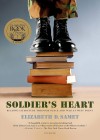Soldiers Heart: Reading Literature Through Peace and War at West Point
Written by: Elizabeth D Samet,
Farrar, Strauss and Giroux, New York, 2007,
ISBN: 9780312427825, 259pp.
Reviewed by: Natalia Forrest
O God of battles! steel my soldiers’ hearts;
Possess them not with fear; take from them now
The sense of reckoning, if the opposed numbers
Pluck their hearts from them.
- Henry V, William Shakespeare
The debate about education versus training in military establishments is a familiar one. The Australian Defence Force continually grapples with its ramifications, and will do so into the foreseeable future. A new book by an English professor teaching at the United States Military Academy at West Point makes an insightful contribution to the discussion about what it is soldiers need to learn if they are to do their job to the best of their ability.
Elizabeth Samet has been at West Point for ten years, and during that time has come to reassess not only her ideas about literature, but also military culture. While this book is ostensibly a memoir, it goes much further. By sharing with the reader her experiences at West Point, Samet explores issues such as the role of women in the Army, patriotism, romanticism of military service, sacrifice and honour. Soldiers Heart may recount the officer training experience in the United States, but the issues it explores will resonate with military professionals on this side of the Pacific as well.
At the heart of this book is the importance of literature. While Samet does not explicitly say that reading literature is a requirement for understanding life, she does see it as an exploration of how literature is an important tool for soldiers who wish to examine both their current situation, and the experiences they may be forced to confront in the future. While many authors write of how literature is a tool for understanding because it can give answers as to ‘what one should do’, Samet sees its value as offering an ambiguous moral state, contained in an ‘indeterminate, open-ended mode of communication [that was] potentially unsettling’.
Samet explains in her book the benefits of West Point cadets exploring such diverse genres as lyric poetry, feminist literature and the Russian classics. That said, there is also an understanding that reading both fiction and non-fiction that deals with military matters is also an important component of the education of soldiers. Literary models are important to the military for various reasons. An obvious one is that military culture is based on many ideas, and so many of those come from literature—from Thucydides to Richard Hooker. While not all of those ideas fit neatly in the mould of what ‘makes a soldier’, they need to be understood if they are to be debated and perhaps refuted. These literary models can also continue to refresh and revive the culture, and revisiting them through literature can help the reader to keep in touch with the ideas that shape their understanding of who they are. More importantly, literature, as part of a liberal education, demands of us to move beyond the technical and the memorisation of facts that training involves—reading literature means we have to think. As the poet Walt Whitman said ‘The reader will always have his or her part to do, just as much as I have mine’.
Despite being written by a literature professor, this is not a didactic guide on what to read to become a good soldier, though she does include a list of recommended books and films. Samet’s book should be read more as an example of how reading, and especially reading literature, can help understand the big issues in life. In a market saturated with ‘how-to’ guides, including numerous books listing what you must read if you are to be considered educated, it is refreshing to come across an author who credits her audience with enough intelligence to make their own decisions.

